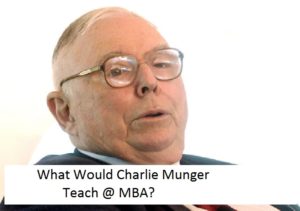
Excellent Book: Charlie Munger For All Seasons
Charlie Munger has many views on many subjects: perspicacious, penetrative and invariably right. His views on how psychology should be taught were most enlightening, much to the trepidation of some psychology professors, especially those without tenure.
Here’s a summary of four ways an MBA class with Charlie Munger might be different.
References:
(i) 2011 Berkshire Hathaway Shareholders Meeting:
(ii) https://www.farnamstreetblog.com/2012/11/charlie-munger-if-i-were-teaching-business-school/
1. The Four Rights, Ferocious Customer Loyalty, and More with Luck Thrown In
(i) Right Managerial System
(ii) Right Personnel Solution
(iii) Right Ethics
(iv) Right Diligence
(v) Etcetera, Etcetera (eg. Rotisserie Chicken priced at $4.99 since time immemorial.)
(vi) Luck (which could mean all of the above plus a lot of hard work).
CM: Costco of course is a business that became the best in the world in its category. And it did it with an extreme meritocracy, and an extreme ethical duty—self-imposed to take all its cost advantages as fast as it could accumulate them and pass them on to the customers. And of course they’ve created ferocious customer loyalty. It’s been a wonderful business to watch—and of course strange things happen when you do that and when you do that long enough. Costco has one store in Korea that will do over $400 million in sales this year. These are figures that can’t exist in retail, but of course they do. So that’s an example of somebody having the right managerial system, the right personnel solution, the right ethics, the right diligence, etcetera, etcetera. And that is quite rare. If once or twice in your lifetime you’re associated with such a business you’re a very lucky person.
2. Look At Graphs From All Angles
(i) What Elements Do You Have Which Adds Costs To Your Business That Your Competitors Don’t
(ii) What Are Your Competitors Doing including those from Traditional Sources and Non-Traditional Sources (and in some cases especially non-traditional sources)
(iii) Success Can Turn Into A Disadvantage: So Be Careful
CM: The more normal business is a business like, say, General Motors, which became the most successful business of its kind in the world and wiped out its common shareholders… what, last year? That is a very interesting story—and if I were teaching business school I would have Value-Line-type figures that took me through the entire history of General Motors and I would try to relate the changes in the graph and data to what happened in the business. To some extent, they faced a really difficult problem—heavily unionized business, combined with great success, and very tough competitors that came up from Asia and elsewhere in Europe. That is a real problem which of course….. our success turning into a disadvantage—is a big problem in business.
And so there are all these wonderful lessons in those graphs. I don’t know why people don’t do it. The graphs don’t even exist that I would use to teach. I can’t imagine anybody being dumb enough not to have the kind of graphs I yearn for. [Laughter] But so far as I know there’s no business school in the country that’s yearning for these graphs. Partly the reason they don’t want it is if you taught a history of business this way, you’d be trampling on the territories of all the professors and sub-disciplines—you’d be stealing some of their best cases. And in bureaucracies, even academic bureaucracies, people protect their own turf. And of course a lot of that happened at General Motors. [Applause]
3. Watch Out For Barons or Be That Baron (in a positive way)
There are game changing elements or barons (according to Munger Speak) at play in business. Look out for them.
CM: I really think the world … that’s the way it should be taught. Harvard Business School once taught it much that way—and they stopped. And I’d like to make a case study as to why they stopped. [Laughter] I think I can successfully guess. It’s that the course of history of business trampled on the territory of barons of other disciplines like the baron of marketing, the baron of finance, the baron of whatever.
4. Teach More About IBM
IBM used to be the biggest computer company in world with overwhelming leads on mainframes, personal computers etc etc. However, the business scene in the domain had changed so much but still IBM survives and thrives. How did they do it? There’s a superb book by Lou Gerstner, former chairman of IBM, entitled: Who Says Elephants Can’t Dance. Well, Lou, the elephant is still dancing and rocking and thanks for your part in it!
CM: IBM is an interesting case. There’s just one after another that are just utterly fascinating. I don’t think they’re properly taught at all because nobody wants to do the full sweep.
There are other areas that Charlie Munger might teach in his hypothetical MBA program eg. psychology, behavior economics, human follies etc etc. For this post, let’s keep it at four.